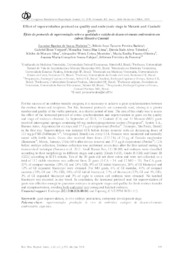Effect of superovulation protocol on quality and embryonic stage in Moxotó and Canindé goats.
Effect of superovulation protocol on quality and embryonic stage in Moxotó and Canindé goats.
Author(s): PINHEIRO, J. B. de S.; BATISTA, R. I. T. P.; VERGANI, G. B.; LIMA, M. S. D.; TEIXEIRA, D. I. A.; SILVA, K. de M.; MONTEIRO, A. W. U.; OLIVEIRA, M. E. F.; SOUZA-FABJAN, J. G.; FONSECA, J. F. da
Summary: For the success of an embryo transfer program, it is necessary to achieve a great synchronization between the embryo donor and recipients. For this, hormonal protocols are commonly used, aiming at a greater number and quality of the viable products, in a shorter period of time. The aim of this study was to assess the effect of the hormonal protocol of estrus synchronization and superovulation in goats on the quality and stage of embryos obtained. In conclusion, the hormonal protocol used for superovulation of goats was effective enough to guarantee embryos in adequate stages and quality for fresh embryo transfer and cryopreservation, avoiding both undesired very young and hatched embryos. [Efeito do protocolo de superovulação sobre a qualidade e estádio de desenvolvimento embrionário em cabras Moxotó e Canindé].
Publication year: 2019
Types of publication: Abstract in annals or event proceedings
Unit: Embrapa Goats & Sheep
Observation
Some of Embrapa's publications are published as ePub files. To read them, use or download one of the following free software options to your computer or mobile device. Android: Google Play Books; IOS: iBooks; Windows and Linux: Calibre.
Access other publications
Access the Agricultural Research Database (BDPA) to consult Embrapa's full library collection and records.
Visit Embrapa Bookstore to purchase books and other publications sold by Embrapa.

